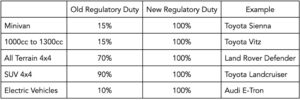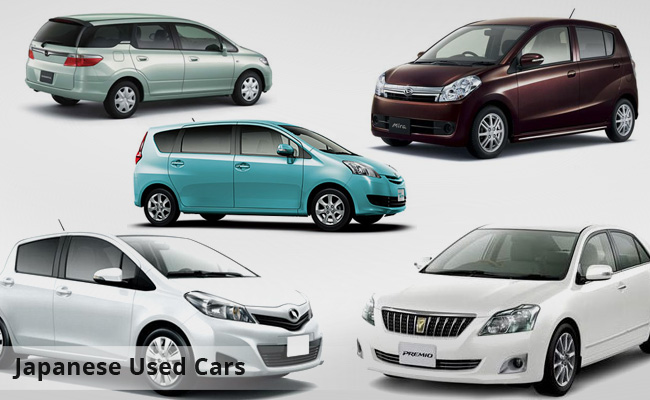LAHORE: The Government of Pakistan, earlier this week, increased both regulatory and additional custom duties on various imported vehicles as a replacement for a complete ban on imported vehicles.
The new regulatory duties per SRO 1571(I)/2022 are as follows:

The new additional custom duties per SRO 1572(I)/2022 are as follows:

The greatest increase in regulatory duties comes to customers for vehicles in the 1000cc to 1300cc category. The four fold increase in regulatory duties for the 1000cc to 1300cc category is likely to dent car imports overall as this is normally a very price sensitive category. Customers aim to find the best deals in this category as an alternative to locally manufactured options.
The minivan category is relatively negligible in Pakistan whereas customers for All Terrain 4×4 and SUVs are already accustomed to paying higher prices.
A noteworthy increase is the 10 fold increase in regulatory duties on electric vehicles. This indicates the Government is cognizant of the loophole in the Auto Policy 2021-26. Though the Government had incentivized the import of electric vehicles to galvanize electrification, companies used the policy as a means to solely cater towards high-net worth individuals by importing their most expensive electric vehicles into Pakistan.
Whether or not this will incentivize importers and companies to provide more affordable options or exit the electric vehicle category entirely remains to be seen.
Furthermore, the additional customs duty is levied upon the most premium customers once more. The efficacy of this increase is debatable given the number of customers in this segment relative to others. However, the more upmarket categories now provide the greatest source of revenue relative forex outflows across vehicles for the government given the total incidence of tax now levied upon them.
This decision comes on the back of last week’s conference by Miftah Ismail, Minister of Finance. At the conference Ismail stated that the import ban imposed on 19th May 2022 will be rescinded due to the need to comply with international trade guidelines.
“So, the choice is simple; we either use that money to buy cars or wheat. That we buy mobile phones or grain, or home appliances, microwaves and air conditioners as opposed to edible oil.” said Ismail while speaking at the press conference in Islamabad.
Imported cars accounted for USD 306,221,000 of the total USD 80,489,884,000 import bill during fiscal year (FY) 2021-22. This translates into 0.38%. The efficacy of a complete ban was always debatable. The increase in custom duties provides the opportunity to improve Pakistan’s current account position whilst also generating additional revenue through customs, particularly given the success in FY 2021/22.
“We are expecting import compression of 60-70%, and it will bring additional revenues to the tune of Rs15 billion on a per annum basis.” said FBR chairman Asim Ahmed to the media.
A knock-on effect of the increase in the duties is that it may provide respite to local automotive manufacturers. Restricting forex outflows increases the likelihood of the State Bank of Pakistan (SBP) rescinding their increased administrative oversight of completely-knocked-down (CKD) kits.
‘Furthermore, this may also provide additional sales volumes to automotive manufacturers as customers redirect their spending from imported cars to local ones. This is particularly key given the massive decline in sales volume experienced by local manufacturers this July, and with similarly bleak prospects expected for the industry going forward.
The long-term ramifications of these protectionist measures in terms of reducing employment in the imported cars sector and the diffusion of innovation across the industry remains to be seen.

























Not sure if Pakistan needs to be investing precious resources in locally manufacturing of cars, given that the same could not be achieved in the last 04 decades. The local engineering industry is still unable to manufacture engines and other key components which continue to be imported. Even if we look at the tractor industry, where the tractors being manufacturers are of late 70s and early 80s model, 100% deletion ha snot yet been achieved. Why not focus our energy to skip industrialization and instead focus on developing skills in IT & Digital segments in our youth. This will enable us to quickly get the precious export dollars which our country need.